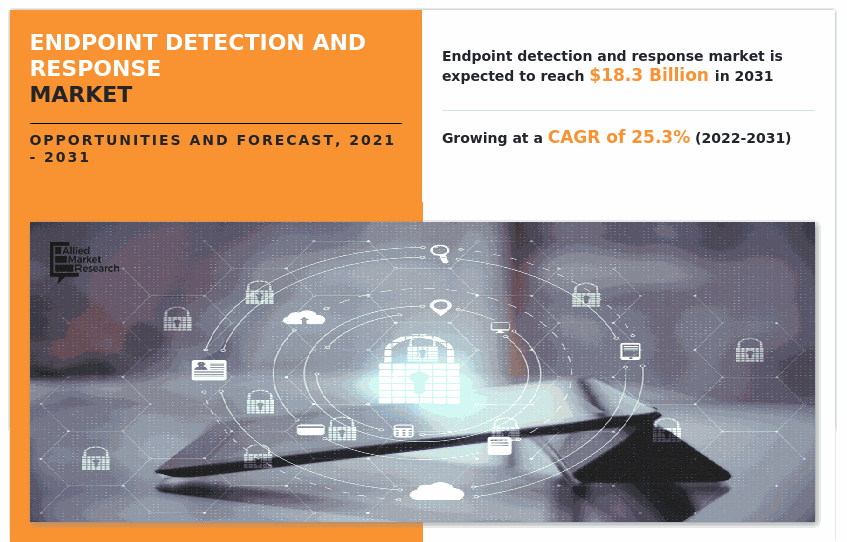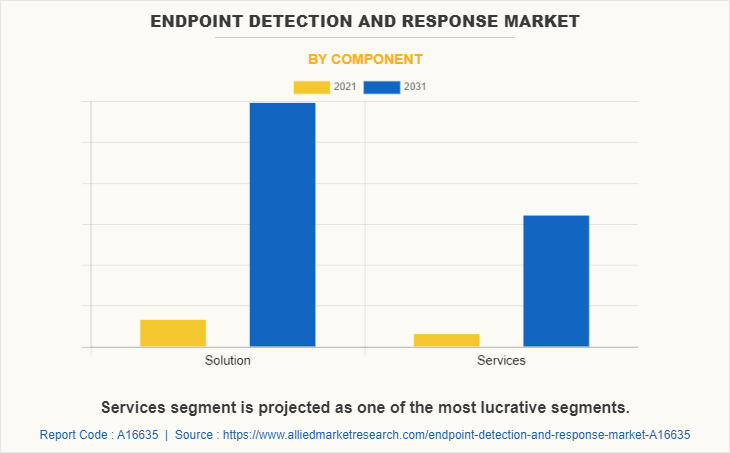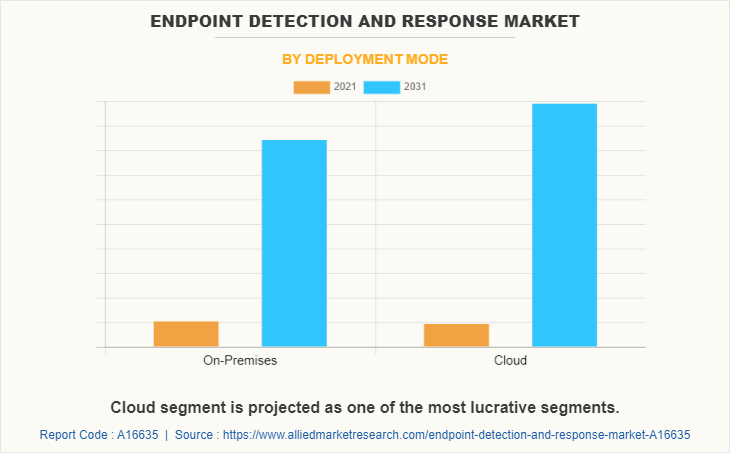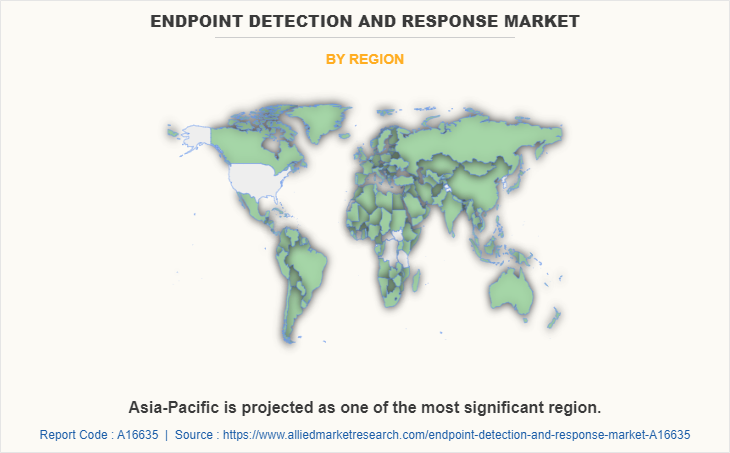Endpoint Detection and Response Market Research, 2031
The global Endpoint Detection and Response Market Size was valued at $1.9 billion in 2021, and is projected to reach $18.3 billion by 2031, growing at a CAGR of 25.3% from 2022 to 2031.
Endpoint detection and response (EDR) provides a variety of advantages including the ability to detect threats in real-time and enabling a breach to stop immediately. In addition, EDR tools assist to analyze data to identify threat patterns, and automatically respond to threats to remove or control them, and notify security personnel. It can also use as a forensics tool to aid in investigation, which is expected to provide lucrative growth opportunities for the market.

Furthermore, it also provides real-time visibility across all endpoints by tracking events and processes such as registry modifications, logins, and network connections. That enables the team or enterprises to investigate any suspicious activity immediately. Furthermore, advanced endpoint detection and response (EDR) process can help reduce the workload of detecting and responding to threats or hazards. It saves time and resources for the security team by reducing the need to constantly monitor multiple tools and dash-boards, which propel the market’s growth.
The endpoint detection and response market is segmented into Component, Deployment Mode, Organization size, Enforcement Point and Industry Vertical. By component, it is bifurcated into software and services. By deployment mode, it is segregated into cloud and on-premises. On the basis of enforcement point, it is categorized into workstations, mobile devices, servers, and point of sale terminals. By industry vertical, it is segregated into BFSI, retail, manufacturing, IT & telecom, healthcare, government & public sector, and others. By organization size it is categorized into small to medium enterprises (SMEs) and large enterprises. Region wise, it is analyzed across North America, Europe, Asia-Pacific, and LAMEA.
On the basis of components, the solution segment dominated the Endpoint Detection and Response Market Share in 2021, and is expected to continue this trend during the forecast period. Endpoint detection and response (EDR) solutions offer a lot of benefits that can improve the detection and response to cyber incidents, such as saving time, money, and resources while helping to cyber security. The EDR solution requires multiple layers of protection. It is important part of the robust security system. Such development boosted the Endpoint Detection and Response Market Growth. However, owing to increased business competition, legislation, user needs, and project risks, the service segment is expected to witness the highest market share in the coming year.

On the basis of deployment mode, the on-premises segment captured the largest market share in 2021, and is expected to continue this trend during the forecast period. This is attributed to the numerous advantages offered by on-premises deployment, such as a high level of data security and safety. Companies prefer on-premises model owing to high data security and fewer data breaches as compared to cloud based deployment models, which drive the demand for public and private sectors. However, rise in the adoption of cloud-based endpoint detection and response, attributed to low cost and easier maintenance, is expected to witness the highest growth in the upcoming year. In addition, it provides flexibility and scalability in order to boost business processes, which propels the growth of the endpoint detection and response market.

Depending on the region, the North America is dominated the market share in 2021, for the endpoint detection and response market. The increased use of endpoint detection and response in forensic, government, and banking & finance for security purposes to improve businesses and customer experience is expected to provide lucrative growth opportunities for the market in the North America region. However, the Asia-Pacific is expected to exhibit highest growth during the Endpoint Detection and Response Market Forecast period. This region has robust IT infrastructure and solid software and services. In addition, increase in penetration of cloud based EDR for security purposes in the healthcare and a life science sector boosts the market growth in this region.

The report focuses on the growth prospects, restraints, and Endpoint Detection and Response Market analysis. The study uses Porter’s five forces analysis to understand the impact of various factors, such as bargaining power of suppliers, competitive intensity of competitors, threat of new entrants & substitutes, and bargaining power of buyers on the Endpoint Detection and Response Industry trends.
Top Impacting Factors
Factors such rise in adoption of BYOD to boost the market growth. In addition, increase in adoption of remote working and rise in number of connected devices further drive growth of the market. Furthermore, rise in demand for advanced technology and rise in demand for robust security in healthcare & life sciences firms are expected to provide lucrative growth opportunities for the market in the upcoming years. However, lack of awareness regarding cyber-attacks and high cost of innovations and budget constraints hamper the market growth.
Increase in adoption of remote working
The emergence of pandemics and increased popularity of remote work among various enterprises forced them to adopt the work-from-home mechanism, which helps in preventing large-scale transmission of viruses to a considerable extent. Furthermore, numbers of companies have many employees working from home as a result, of the threat of malware attacks, and data breaches, which tightened their grip due to the remote work mechanism. To overcome these problems, many enterprises are adopting endpoint detection and response (EDR) solutions to tackle such problems, which eventually help in boosting the growth prospects.
Furthermore, the enterprises are continuously involved in product innovation processes. For instance, the cybersecurity firm, Sequretek launched the “Sequretek endpoint detection prevention response (EDPR)”. It is a comprehensive endpoint agent which provides anti-malware, application whitelisting, patching, advanced persistent threat detection, and protection. Such development enhances remote work safely, securely, and efficiently, to boosting growth of the market.
Impact of COVID-19 on the Market
The current estimation of 2031, it projected to be higher than pre-COVID-19 estimates. The ongoing pandemic has triggered social stress and leading to economic disruptions throughout the globe. It has positively impacted the adoption of endpoint detection and response (EDR) owing to lockdown imposed by governments of different countries. Post COVID-19 impact, companies are focusing on emerging technologies, such as AI-powered solutions, automation, computing technology, and cloud-based endpoint detection and response across industries such as BFSI, healthcare, government and others to perform contactless operation, with safely and securely, which creates demand for EDR solution and boost the market globally.
Furthermore, as industries move towards digitalization, it creates the demand for a robust and AI-integrated EDR solution to provide agile efficiency and provides real-time reporting features. Moreover, owing to such benefits, it provides lucrative growth opportunities for the market growth during the forecast period. The pandemic has introduced considerable challenges for companies that don’t have the infrastructure to execute key processes, report accurately with data spread over multiple locations to operate complex systems, and communicate with teammates efficiently.
Hence, a greater number of companies are investing in endpoint detection and response for safely manage work process. Post pandemic endpoint detection and response (EDR) solution provides limitless scalability and continual enhancement of functionality, which is critical in achieving digital transformation and anticipating the growth of the Endpoint Detection and Response Industry.
Key Benefits For Stakeholders
- This report provides a quantitative analysis of the market segments, current trends, estimations, and dynamics of the endpoint detection and response market analysis from 2021 to 2031 to identify the prevailing endpoint detection and response market opportunities.
- The market research is offered along with information related to key drivers, restraints, and opportunities.
- Porter's five forces analysis highlights the potency of buyers and suppliers to enable stakeholders make profit-oriented business decisions and strengthen their supplier-buyer network.
- In-depth analysis of the endpoint detection and response market segmentation assists to determine the prevailing market opportunities.
- Major countries in each region are mapped according to their revenue contribution to the global market.
- Market player positioning facilitates benchmarking and provides a clear understanding of the present position of the market players.
- The report includes the analysis of the regional as well as global endpoint detection and response market trends, key players, market segments, application areas, and market growth strategies.
Endpoint Detection and Response Market Report Highlights
| Aspects | Details |
| By Component |
|
| By Deployment Mode |
|
| By Organization size |
|
| By Enforcement Point |
|
| By Industry Vertical |
|
| By Region |
|
| Key Market Players | Palo Alto Networks, Inc., McAfee, LLC, Trend Micro Incorporated, Cisco Systems, Inc., RSA Security LLC., Crowdstrike Inc., Microsoft Corporation, Carbon Black Inc., Intel Corporation, Symantec Corporation |
Analyst Review
According to CXOs of leading companies, enterprises have witnessed various changes in business processes, operations, and industrial automation. Moreover, organizations are shifting toward digitalization and increase in implementation of Industry 4.0 to cope with ongoing tough business competition and rising cyber-attacks. This eventually creates the need for endpoint detection and response (EDR) in sectors for security and safety purpose. However, cyber-attacks are evolving, adapting, and adopting more complex attack techniques as they are forced to discover launch strikes. Identifying and targeting frequent blind spots in enterprise security infrastructures is one of the most common attack strategies. Furthermore, increased investments from organizations in products including endpoint protection platforms (EPP) and endpoint detection and response (EDR) solutions propel the market growth. For instance, in November, 2020; Symantec, a division of Broadcom, did a strategic investment in security products and services to target cyber attacker efforts to exploit the exact blind spots. Due to such reason, Semantic Corporation added new abilities to its Semantic EDR portfolio, “Symantec Endpoint Security Complete (SESC)” raising its investments in advanced levels of protection.
Furthermore, these enhancements to Symantec Endpoint Security Complete (SESC) bring a new level of comprehensive security by eliminating common blind spots in most enterprise security infrastructures. In addition, enterprises are also constantly adding new features to SESC, such as “Granular Activity Recorder Rules,” to help analysts and system administrators collect data even more efficiently and eliminate unnecessary event noises. Such developments and advancements drive growth of the market.
On the contrary, prominent market players are offering EDR solutions and are actively looking forward to collaborate their solutions with other managed security services providers. For instance, in January 2020, EDR providers, SentinelOne, partnered with the CriticalStart to integrate its endpoint protection (EDR) abilities into “Sentinel One’s EDR” services. This partnership enabled its endpoint protection platform to centralize, ingest, and correlate security logs. Hence, owing to such partnerships both enterprises are expected to enhance their EDR capabilities in the upcoming years.
Factors such rise in adoption of BYOD to boost the market growth. In addition, increase in adoption of remote working and rise in number of connected devices further drive growth of the market. Furthermore, rise in demand for advanced technology and rise in demand for robust security in healthcare & life sciences firms are expected to provide lucrative growth opportunities for the market in the upcoming years
The leading applications of Endpoint Detection and Response solutions includes BFSI, retail, manufacturing, IT & telecom, healthcare, government & public sector, and others
Depending on the region, the North America is dominated the market share in 2021, for the endpoint detection and response market. The increased use of endpoint detection and response in forensic, government, and banking & finance for security purposes to improve businesses and customer experience is expected to provide lucrative growth opportunities for the market in the North America region.
The global endpoint detection and response market was valued at $1,937.32 million in 2021, and is projected to reach $18,317.02 million by 2031, growing at a CAGR of 25.3% from 2022 to 2031.
This report gives an in-depth profile of some key market players in the endpoint detection and response market, include Carbon Black Inc., Cisco Systems, Inc., Crowdstrike Inc., Intel Corporation, McAfee, LLC, Microsoft Corporation, Palo Alto Networks, Inc., RSA Security LLC., Symantec Corporation, and Trend Micro Incorporated.
Loading Table Of Content...



